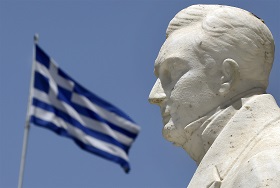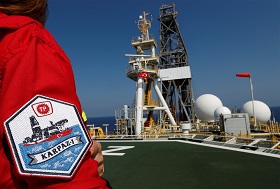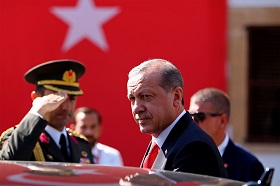Will Erdogan's Adventures Hurt Russian Soft Power?
(votes: 5, rating: 4.2) |
(5 votes) |
Associate Professor of International Relations (ret.), University of Cyprus
While the Russian Federation is actively pursuing the cultivation of its Soft Power, the results, in the present cynical and confusing international environment, appear to be mixed. Admittedly, these are “Russophobic” times in the West. Moscow, then, must struggle to undermine widespread anti-Russian propaganda. Hence it seems that Russia should also “contain” its own “Turkey problem.” For during the current Russia-Turkey manifold “embrace,” President Erdogan's errors - that are condemned all-but universally today - could damage Moscow's own image and international prestige.
This article will revisit Erdogan's characteristic foreign policy decisions, actions, and “claims” in the Mediterranean, the Middle East and the Aegean Sea, with particular emphasis on Ankara's obsessive aggression against Cyprus and Greece through Erdogan's endless military threats and legal and factual distortions. This behavior against Moscow's two traditional friends needs to be exposed in order to falsify the banality of fake news and fake analyses. The Conclusion, therefore, will entail that Moscow should minimize the toxic effects of Erdogan's adventurism on Russia's Soft Power.
While the Russian Federation is actively pursuing the cultivation of its Soft Power, the results, in the present cynical and confusing international environment, appear to be mixed. For instance, in a 2019 paper, an Israeli analyst argued that “Russian soft power efforts in the Middle East are bearing fruit, as many young Arabs now view Moscow as an ally and the US as unreliable [1].” But the “SOFT POWER 30” Index, for 2019, places Russia 30th among 30 states, below Turkey's 29th score. Admittedly, these are quite “Russophobic” times in the West, except for occasional positive gestures by some Western capitals and the explicit support for many Russian policies by Cyprus and Greece. Moscow, then, must struggle to undermine widespread anti-Russian propaganda. Hence it seems to Russophile Greeks of Cyprus and Greece that Russia should also contain its own “Turkey problem.” For during the current Russia-Turkey manifold embrace, President Erdogan's behavior could damage Moscow's own image and international prestige.
This article will revisit Erdogan's characteristic foreign policy decisions, actions, and claims in the Mediterranean, the Middle East and the Aegean Sea, with particular emphasis on Ankara's aggression against Cyprus and Greece through Erdogan's military threats. The behavior against Moscow's two traditional friends needs to be exposed in order to counter the spread of fake news and erroneous analyses. The Conclusion, therefore, will entail that Moscow should minimize the negative effects of Erdogan's adventurism on Russia's Soft Power.
Erdogan's Goals and Means in the Eastern Mediterranean, the Middle East, and the Aegean Sea

Greece and Russia: Back to the Truman Doctrine?
President Erdogan has long been guiding Turkey's belligerent regional adventures, driven by his professed ambition to establish the “New Turkey” and meet “the Borders of his Heart.” Echoing the neo-Ottoman syllogistic of his one-time mentor, Dr. Ahmet Davutoglu, he has repeatedly claimed inter alia that Turkey, as “victimized” by the Lausanne Treaty, “deserves” to regain its former (Ottoman) possessions. Thus, he has named as legitimate targets vast areas of present-day Syria, Iraq, Greece, its Aegean Islands, and Cyprus.
Erdogan's self-declared ambitions help us call Turkey's military interventions - in Northern Syria, Northern Iraq, Libya, and the Exclusive Economic Zone of the Republic of Cyprus - by their proper name: expansionism contrary to International Law. Nevertheless, Ankara presents itself and its policies as “in accordance with International Law.”
Similarly, in another formulation, Ankara's officials and spokespersons make their territorial “claims” in terms of Turkey's “rights and interests.” Therefore, they conflate these distinct concepts, aiming to extract “rights” even from subjectively and artificially conceived chauvinistic interests. “Rights,” of course, should be premised on solid legal grounds; subjectively-defined interests are, for International Law, “neither here nor there.” And yet, Erdogan and his foreign minister Mevlut Cavusoglu, his defense minister Hulusi Akar and the foreign ministry's Hami Aksoi adopt the language of “rights and Interests,” as when they claim to pursue Turkish ambitions in what they have called “Blue Homeland.”
This neologism about a vast Eastern Mediterranean area covers half the Aegean Sea, “appropriating” all the Greek Islands of the Eastern Aegean. Moreover, by sheer Turkish Diktat, it includes the entire Exclusive Economic Zone of Cyprus and part of the EEZ of the Dodecanese Islands and Crete. So, what are Ankara's alleged “grounds” for these claims? Turkey replies that “according to International Law,” Islands do not have either Continental Shelf or an Exclusive Economic Zone.
The claim appears inaccurate, for it contradicts the 1982 United Nations Conference on the Law of the Sea (UNCLOS), which states (Article 121):
- An Island is a naturally formed area of land, surrounded by water, which is above water at high tide.
- Except as provided in paragraph 3, the territorial sea, the contiguous zone, the exclusive economic zone and the continental shelf of an island are determined in accordance with the provisions of this Convention applicable to another land territory.
- Rocks which cannot sustain human habitation or economic life of their own shall have no exclusive economic zone or continental shelf.
Article 121.2 explains why Turkey refuses to sign UNCLOS, hoping it could substitute gunboat diplomacy for International Law. The UNCLOS, however, is part of International Customary Law, ratified by 167 states and by the European Union (EU), which Turkey hopes to join. Thus, the undisputed applicability of Article 121 has led to the massive condemnation of Ankara's associated provocations.
Turkey's “neo-surrealist” claim (as Greek FM Nikos Dendias once quipped) about Islands is currently extended to its two “MoUs” with Libya's GNA government in Tripoli. The memorandum allegedly delineating a Turkey-Libya EEZ presupposes the elimination of the sovereign rights of numerous Greek islands, including Rhodes and Crete, by abolishing their Continental Shelf and EEZ. The EU has repeatedly deplored this memorandum as illegal. Athens and Nicosia have rejected both memoranda as “null and void.” Washington has variously expressed its condemnation calling them “provocative and counterproductive.”
Egypt's own condemnation, submitted to the Security Council on December 19, 2019, was premised both on the technical fact that Libya's “House of Representatives has not endorsed the two memorandums of understanding with Turkey” and the palpable geographic fact: “Egypt rejects Turkey-Libya sea rights, security agreements”:
The maritime deal would give Turkey access to an economic zone across the Mediterranean, over the objections of Greece, Cyprus, and Egypt, which lie between Tukey and Libya geographically.

Drilling at Gunpoint: EU Sanctions on Turkey
A week earlier, Russian Ambassador to Athens, Andrey Maslov, commented on various issues during an annual press briefing: “Speaking on bilateral relations, Maslov said, Greece is a traditional and reliable partner for Russia in Europe, and the two countries can continue building their relations 'even under the anti-Russian situation of sanctions' by the EU.” He also expressed appreciation for “the established stance of the Greeks, that the architecture of security in Europe must include Russia as well.” And when asked about the recent Turkey-Libya memorandum on maritime zones, “the ambassador said he did not want to 'enter into detailed commentary' on the issue, which should be left to experts, but 'the main issue is to observe the principles of international law, including the Lausanne Treaty of 1923 and the UN Convention on the Law of the Sea of 1982'.
To Moscow's credit, and given the mounting Libya crisis, Ambassador Maslov returned to the accusation of Turkey, when he declared explicitly: Islands do have a continental shelf and Exclusive Economic Zone (EEZ) in face of Turkey's insistence that they do not.
French President Emmanuel Macron, infuriated by Turkey's manifold illegality in Libya, including its hostile actions against the French frigate, declared “the historical and criminal responsibility” of Turkey.
Finally, Greek FM Nikos Dendias visited the President of the Libyan House of Representatives, Aguila Saleh, on July 1, 2020. In his published Statement, Mr Dendias summarized his positive discussion with Mr Saleh, including a potentially historic prospect:
We also talked about the delimitation of maritime zones between Greece and Libya, not in the framework of illegality, as is the case with the so-called Sarraj-Turkey memorandum, but in the framework of International Law and follow-up to the relevant talks held between Greece and Libya in 2010.
Despite such powerful international outcry, Erdogan and his ministers keep insisting that their decisions and actions “accord with international law.” Moreover, whenever Nicosia and Athens' governments confront Ankara's behavior, the latter accuses them of “not knowing their place in the world.” Therefore, verbal provocations accompany Turkey's aggression adding insult to injury. Furthermore, since these violations of International Law and International Ethics are being progressively accumulated and intensified, they entail further negative consequences: Erdogan's self-imprisonment in his untenable claims; the anti-Hellenic brainwashing of the Turkish people and Turkey's Media; and their endorsement by the Turkish Opposition who, in chauvinistic competition, frequently become more “Erdoganian” than Erdogan himself.
Recent Escalating Aggression Against Cyprus and Greece
Traditionally, Greece and Cyprus have insisted on dispute-resolution according to International Law and friendship and cooperation with Ankara and the Turkish people. More recently, Nicosia and Athens realized that Turkey's appeasement had proved utterly counterproductive: Erdogan's and his associates' offensive rhetoric, explicit anti-Hellenic threats, and historical and legal distortions kept escalating as some examples suffice to demonstrate.
To begin with, Erdogan's close adviser, Yigit Bulut, after asserting his “certainty” that Washington plans to make Greece attack Turkey, declared that, since Greece “is no match for Turkey's might,” it would be “like a fly picking a fight with a giant.” Moreover, regarding the Greek Imia islets that Turkey has decided to “claim,” Bulut stated in January 2018: We will break the arms and legs of any officers, the Prime Minister, or of any minister, who dares to step onto Imia in the Aegean (ibid.)
Also, in 2018, when a few isolated fascists burned a Turkish flag in Athens, Mustafa Deztiji, Erdogan's political ally, declared, “The Turkish flag one day will fly again in Athens.” In March 2018, Erdogan announced with macabre pomposity how he conceived the “New Turkey” materialization, “Certainly, we will build a great and dynamic future for Turkey, and for this, we will sacrifice our life and take the lives of others when needed.”

Playing Pick-Up-Sticks in Libya — 2
Such rhetoric was not improvised or temporary. Burak Bekdil, the distinguished Turkish columnist, offered memorable comments on the 2020 celebrations of Constantinople's 1453 conquest. Since Erdogan commemorated the conquest personally with Islamic prayers at the Hagia Sophia, arguably Christianity's holiest monument, Bekdil wrote among other things:
In Turkish jargon…it is “conquest” when we do it and “invasion” when others do it. In this year's celebrations, President Recep Tayyip Erdogan raised the stakes when he spoke of the conquest prospectively, not just retrospectively. “I wish that God grant this nation many more happy conquests,” he said at a celebration where he recited from the Quran. .
In all this typically Turkish “conquest” fanfare, a serious question remains to be asked: When Erdogan wished God to grant Turkey many more happy conquests,” which non-Turkish lands is he hoping to “conquer”?
Besides such provocative verbal actions; Greece and Cyprus also experience Turkey's unending hostility by non-verbal actions. They include the permanent violation of Greek airspace in the Aegean and the Athens Freedom of Information Region (FIR) by armed Turkish military jets, demonstrating Ankara's expansionist dreams; the daily flights by Turkish military jets over Greek Aegean islands, often a few hundred meters above the terrified inhabitants; the constant issue of illegal NAVTEX within the Republic of Cyprus' EEZ, long aiming to cancel or disrupt Nicosia's hydrocarbon program; the “abortion” of gas drilling by SAPIEM 1200 in Bloc 3 of the Cypriot EEZ in March 2018 by the Turkish Navy, violating Cyprus' contract with the Italian company ENI; the deliberate crash of a Turkish coast guard vessel into a Greek patrol boat off Imia in February 2018, literally threatening Greek sailors' lives.
In 2019, Ankara intensified its “third invasion” within the Cypriot EEZ, by sending new drilling ships always accompanied by the Turkish Navy. The EU Institutions and individual Member-States flatly condemned these actions. Official Russian voices have consistently condemned Ankara's relevant behavior since 2011, and Russian Ambassador Stanislav Osadchiy regularly declares that Moscow recognizes Cyprus' sovereign rights in its EEZ. At the same time, Ambassador Tasos Tzonis received the same assurances when he met Deputy Foreign Minister Alexander Grushko last October: “Full Russian support for the Republic of Cyprus' sovereign rights in its sea zones during Tzionis' discussions in Moscow.” [2] And yet, because all the statements condemning Turkey haven’t been accompanied by tangible sanctions, Erdogan remains unmoved, fixated on brutally contradicting the principles and norms of International Law.
The Evros Crisis as a Test-Case
In early 2020, the whole world witnessed in awe the incredible Evros River Crisis, at the northern Greece-Turkey border. During a late February Greek holiday, the “hybrid invasion” of Greece was attempted by thousands of people, misled by Ankara to believe that “Turkey's borders with Europe are now open.” Erdogan had opened Turkey's border to Greece while Athens had declared it closed, unable to host any more than the thousands it has been forced by Turkey to accept on the Aegean Islands and mainland Greece. Moreover, the overwhelming majority of these people were neither “refugees from Syria” nor even refugees, mainly economic migrants, primarily from Pakistan, Afghanistan, and North Africa. As it transpired, they included former prisoners in Turkish prisons and real jihadists from Syria.
What is happening here is a textbook case for destabilizing entire regions. The situation is similar to the pre-Balkan crisis in Kosovo. Erdogan's movements follow the same patterns as the ones that preceded his intervention in Syria, when he used the populations expelled from there as weapons and an alibi [3].
In addition to “weaponizing” thousands of miserable people in order to destabilize Greece and “flood the EU” (Erdogan's stereotypical threat) to extract pro-Turkey decisions - including more money and support for his Syria adventures - the crisis was aggravated by Ankara's orchestrated campaign of fake news and vicious propaganda. Immature Western journalists, passionate Turkish propagandists, and some naïve Western academics were deceived by Turkey's fabricated news and unethical misinformation, threatening Greece's dignity and prestige.
But the EU's top leadership set the record straight. It gave full support to Greece through the visit to Evros River by European Commission President Ursula von der Leiden, European Council President Charles Michel, European Parliament President David-Maria Sassoli, and Croatian Prime Minister Andrej Plenkovic. They were escorted by Greek PM Kyriakos Mitsotakis, who said that “Turkey has now become an 'official migrant smuggler'.” The EU leaders added that “It is no longer a refugee-migration problem but an 'asymmetric threat' to Greece's eastern border, which is also Europe's border.”
Ankara's psychological warfare included the Interior Minister's unashamed lie that “117,677 refugees have crossed into Greece” (ibid.). EURAKTIV's Balkan expert, Georgi Gotev, explained in detail (ibid): that “the total number of migrants gathered in the border areas is estimated at some 20,000”; that the Greek authorities said that fewer than 200 migrants have managed to cross the border; and that “Greece has already sentenced all of them to four years of jail for illegal crossing.”
Therefore, the tragedy turned into Erdogan and his regime's downturn. Eventually, Greece took effective measures to protect its and Europe's borders from such “hybrid warfare.” While It attracted the respect of political elites and honest foreign commentators, the notorious pro-Erdogan Daily Sabah continued its unending anti-Hellenic hate-speech, as evidenced from the following formulation:
Ankara recently announced that it would no longer try to stop asylum-seekers, refugees, and migrants from crossing into Europe. Thousands have since flocked to Turkey's Edirne province, which borders Greece and Bulgaria to make their way into Europe.
Daily Sabah's attack used dubious statements by a certain “refugee rights researcher” and “advocate at Human Rights Watch,” who insulted the Greek security forces for having “detained, assaulted, sexually assaulted, robbed, and stripped asylum-seekers and migrants.” This fabrication has been totally falsified by independent reporters and commentators; by the aforementioned top EU officials; and by the European Border and Coast Guard Agency (FRONTEX). Hence, Michael Rubin's April 1, 2020, commentary, entitled, “Human Rights Watch reports are no longer credible.”
The Evros case illustrates Ankara's ruses, narratives’ manipulation and other practices deployed in the Eastern Mediterranean, the Cypriot EEZ, the Aegean Sea, Syria, Iraq, and now Libya, in order to implement Erdogan's megalomania [4]. What deserves a separate treatment is why Hellenism is Erdogan's fixed target, verbally abused daily and threatened militarily unless Cyprus and Greece yield to his blackmail.
For now, the following hypotheses seem irresistible: (1) Turkey's anti-Hellenic geopolitical bulimia erupted in the 1970s when oil reserves were discovered in the northern Aegean and Ankara decided to claim half the Aegean Continental Shelf; (2) the “Blue Homeland” consists primarily of Greek territories and Greece's threatened sovereign rights; (3) Turkey had always regarded Greece as far weaker than Turkey and weaker than what Greece really is; (4) Turkey cannot forgive Cyprus and Greece for their EEZs' hydrocarbon deposits in contrast to missing its own; (5) Erdogan cannot “tolerate” that Hellenism has weaved substantial collaboration with neighboring Egypt, Israel, Jordan, and Lebanon; increasingly with France; and perhaps with (hovering) Italy; and (6) Turkish theologian, Cemil Kilic, asked about Erdogan's passion for turning Aghia Sophia into a mosque, admitted inter alia Turkey's “sense of inferiority vis-à-vis the West.” If so, for obvious historical and cultural reasons, one could deduce that Erdogan's inferiority complex towards Hellenism may be far more robust and probably incurable.
Conclusion
Previous RIAC articles authored by me since 2017 have celebrated Russia's very special links and bonds with Hellenism, premised on mutual interests, shared values, historical/cultural affinities, and respect for International Law. More recently, I recognized some reservations and joint complaints in Russia-Cyprus relations, emanating primarily from the Moscow-Ankara “multiple embrace.” However, progressively, Erdogan's “sui generis personality and geopolitical megalomania have worsened Russia-Turkey relations since, besides concurrence, they also exhibit contradictory perceptions and interests, rights, and suspicions.
Moreover, Erdogan's opportunism, adventurism, and overextension show today signs of despair, since certain decisions have traumatized Turkey’s economy while questionable actions have isolated the country. The EU's alarming inaction toward Erdogan's aggressiveness, especially against Cyprus and Greece, was primarily a matter of some member-states’ economic interests.
In summer 2020, however, after President Macron's aforementioned eruption, Angela Merkel's seeming exhaustion, the threat of an Egypt-Turkey military confrontation, the apparent failure of Josep Borrel’s peace-making trip to Ankara, Turkey’s exhibition of Realpolitik cum Machtpolitik, and, finally, after the bombing of Turkey-supported targets in Libya (al-Watiya), the EU seems to be changing its mind. After all, Erdogan's Libya intervention has secured substantial international condemnation by numerous actors - France, Egypt, UAE, Saudi Arabia, Syria, Cyprus, Greece, and Russia - sufficient to miss the next “SOFT POWER 30.” Inevitably, Russian Soft Power is being victimized by the Erdogan association. Hence Moscow, uniquely capable of containing its trouble-making associate, is ideally placed to take appropriate initiatives: as a service to international stability, international dignity, and Russia's international image and prestige.
1. Shay Attias, Russian Soft Power in the Middle East, BESA Center Perspectives Paper No.1,238, July 26, 2019
2. See Cyprus News Agency, October 15, 2019.
3. Any country would act like Greece, Cyprus Mail, March 5, 2020
4. For Erdogan’s array of deceptive rhetorical devices, see Costas Melakopides, Brief Remarks on President R.T. Erdogan and His Allies’ Methodical Use of Logical Fallacies, RUDN Journal of Political Science, Vol. 20, No.3, 2018, pp. 376-386.
(votes: 5, rating: 4.2) |
(5 votes) |
The next few months will make clear whether Moscow remains prepared to pursue the “cohabitation” of its “material embrace” with Turkey and its time-honored “special relationship” with Cyprus
Greece and Russia: Back to the Truman Doctrine?Despite the public relations spin on events, little has altered since the assassination of Greece’s first pro-Russian leader, Count Kapodistrias
Drilling at Gunpoint: EU Sanctions on TurkeyRestrictions are often more effective when applied against allies than opponents
Playing Pick-Up-Sticks in Libya — 2Is Turkey’s Matrak Worth Playing?





